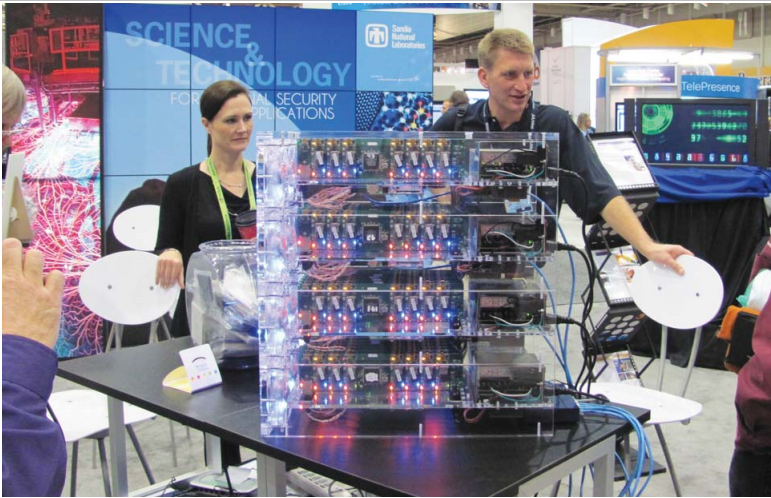
Annual supercomputer conference keeps focus on state of the art
Sandia was well-represented last month at SC10, the annual high-performance computing, networking, and storage event held in New Orleans this year. Spotlighting the most original and fascinating scientific and technical applications from around the world, SC10 brings together scientists, engineers, researchers, educators, programmers, system administrators, developers and program managers from various sectors. Participants representing industry, academia and government research organizations take part in presentations, workshops and exhibits featuring the latest break[1]throughs in high-performance computing, networking, storage and analysis. “The SC conference series is truly a remarkable gathering of the best minds in the computing community on both the provider and user side,” says Barry Hess (9610), who served as SC10 General Chair. Sandia played an unusually strong leadership role at the SC show this year. In addition to Barry’s chairmanship, Jamie Van Randwyk (8966) served as Chair of SciNet, the ultra-high-performance network built to support the conference (Jamie was essentially responsible for positioning the convention venue as one of the most “connected” places on earth for a week). Jim Costa (8950) served as Deputy Technical Program Chair, and many other Sandians volunteered on a variety of SC10 committees. For the first time in many years, Sandia maintained its own booth at SC10 and also had its traditional presence at the NNSA / ASC (Advanced Simulation and Computing) exhibit area. “We recognized that a focused presence at SC10 could help publicize the Labs’ diverse portfolio of HPC research and growing application to technical challenges in cyber security, energy and other national security areas,” said Ben Cook (5641), manager of Sandia’s Cyber Enterprise Capabilities group. “In addition, we thought our own booth at SC10 would help engage the external HPC community in the broad range of research collaboration and career opportunities available at Sandia.”

were among several Sandians who staffed the Sandia booth at
SC10. At right, Ron Minnich (8961), center, provides an overview
of Mega Tux. The project aims to boot a million virtual machines on
large, high-end supercomputers. Success will help cyber security
experts in combating malicious botnets.
The Sandia booth, says Ben, was intended to complement the lab’s long-standing support and participation in the ASC program booth, an activity that remains a significant program focus for Sandia’s high[1]performance computing efforts. The Sandia booth featured demos by Will Atkins (5628), who provided overviews of the Virtual Control System Environment (VCSE), and Ron Minnich (8961), who described the anti-botnet “Mega-Tux” work going on at Sandia (Lab News, July 1, 2009). A number of other Sandians, including Tim Berg and Jimmie Wolf (9336), Keith Vanderveen (8961), Ron Oldfield (1423), Chrisma Jackson (5625), and Curtis Janssen (8953), volunteered their expertise and answered questions about Sandia’s high-performance computing and cyber security research efforts and capabilities. Across the Exhibits Hall at the NNSA/ASC booth, a large team of Sandians from numerous ASC projects from across the lab showcased their recent technical accomplishments. Ann Gentile, Jim Brandt, and Jack[1]son Mayo (all 8953), for example, ran its OVIS software program to interested onlookers and potential users. OVIS is a tool for intelligent, scalable, real-time monitoring of large computational clusters. “Supercomputing is a universal scientific instrument – one with the power to make the world a better place for all of us,” says Barry. “You can really feel that potential when you’re at the conference.”